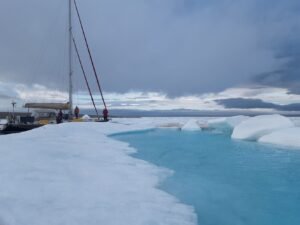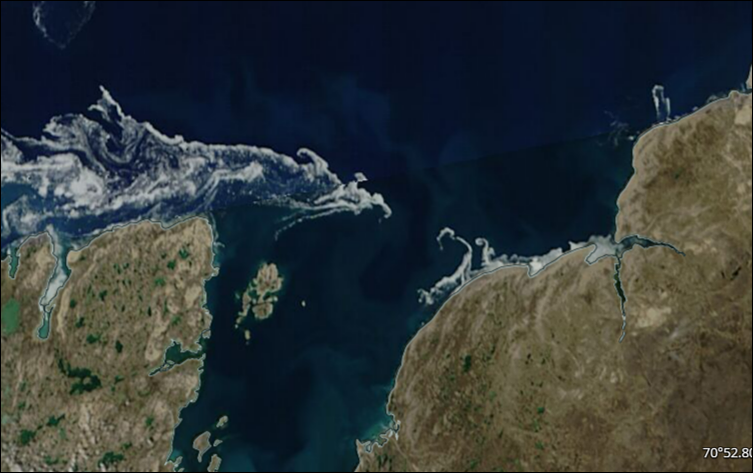
We weren’t expecting to get out of Pasley Bay on our last day there, and we very nearly didn’t. The wind had died in the night, and the small bits of open sea between the floes were skinned over with ice. The air was warm though, with strong sunshine. By a stroke of luck we had retrieved our anchor the day before with much hard labor, and were tied up, with Taya alongside, to some grounded floes that had proved immobile for some time. I was amusing myself by pushing little pans of ice about with an ice pole, seeing whether I could open up a deeper harbor for Polar Sun on the far side of the floe. All around was the sound of dripping water, and the occasional whoosh as a floe split and water rushed into the gap.

Suddenly a light west wind sprang up, and the floe we were tied to shifted and broke. A few leads of open water began to appear, and our haven became untenable: we would have to move again, before the huge ice-boulder we were tied to collapsed. Its foundations were now eroding fast, and it was supported by only a few thin columns of dripping ice. Taya lost no time in casting off and pushing an ice pan out of her way to get into deeper water and look about. Jacob, our Inuit friend who was regretting having joined us for the trip from Pond Inlet to his home in Gjoa, said “Now’s our chance!” Mark was reluctant to trade the comparative safety of the grounded floe for the uncertain prospect of shifting ice elsewhere, but in the end, as he saw Taya battling further toward the entrance along incipient leads, and seeing one of them begin to close between us and her, decided we’d better follow. After all, wherever we went couldn’t be worse than where we were was about to be.


It was a glorious battle against the ice. Stationing two men with ice poles at the bow, and Renan with a camera at the masthead, we fought and wound our way through the pack. Shouldering aside the smaller bits, sliding the hull along the larger floes, nearly aground more than twice, but always a way ahead would open up and Renan would call directions from aloft.

We didn’t really think we’d make it all the way out—we were just moving northward hoping for a better spot. But fortune favors the bold, and we kept pressing on as long as there was a lead or a chance, and after several hours the icepack thinned and Polar Sun, uncrushed, unscathed, and with all her gear intact, emerged into open water in Larsen Sound.
It was like new life breathed into our long-trapped souls. Southbound in open water! But we weren’t out of the woods yet. A long, narrow tongue of pack ice had been slowly reaching across from the Victoria Strait, and was about to join the shore-side pack and close off our way to the James Ross Strait. It would have been too much to bear, to get out of Pasley at last and find the way, that had been open since our imprisonment, shut again, and it very nearly happened. We dodged through the narrow leading edge of pack ice, doglegged around the shore ice, and were in open water again with maybe an hour, maybe less to spare. Taya and Polar Sun were the last boats to get through that ice: we learned later in Gjoa Haven that the next ship, a 100-foot steel working boat, just several hours behind, had to call for icebreaker support.



And if there aren’t many pictures to illustrate this last little bit of the post, don’t blame it on laziness: blame it on a landscape so flat and featureless that it would be like shooting a close-up of the side of a brown paper bag. Never have I seen so uninteresting a landscape as that presented by King William and Victoria Islands. To the north and west, even though barren and bleak and blasted, the landscape has elevation gains and short cliffy bits, or at least taller bars of rock and gravel. But King William Island is about as near a flat gray sandbar as you’ll ever hope to find—or hope to avoid, if scenery is your thing.
We spent three days in Gjoa, resting, regrouping, re-planning our future, which proved as uncertain and changeable as our chances had been of getting out of the ice in Pasley Bay. But I’ll tell you all about that another time.